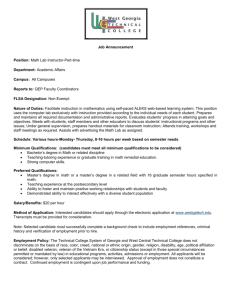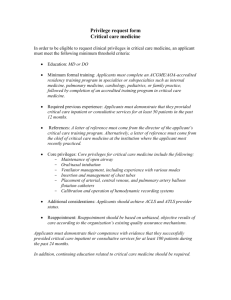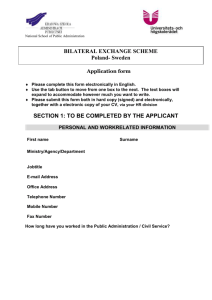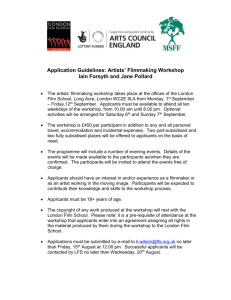Kasserne” med supplerende retningslinjer til oversættelse til engelsk
advertisement
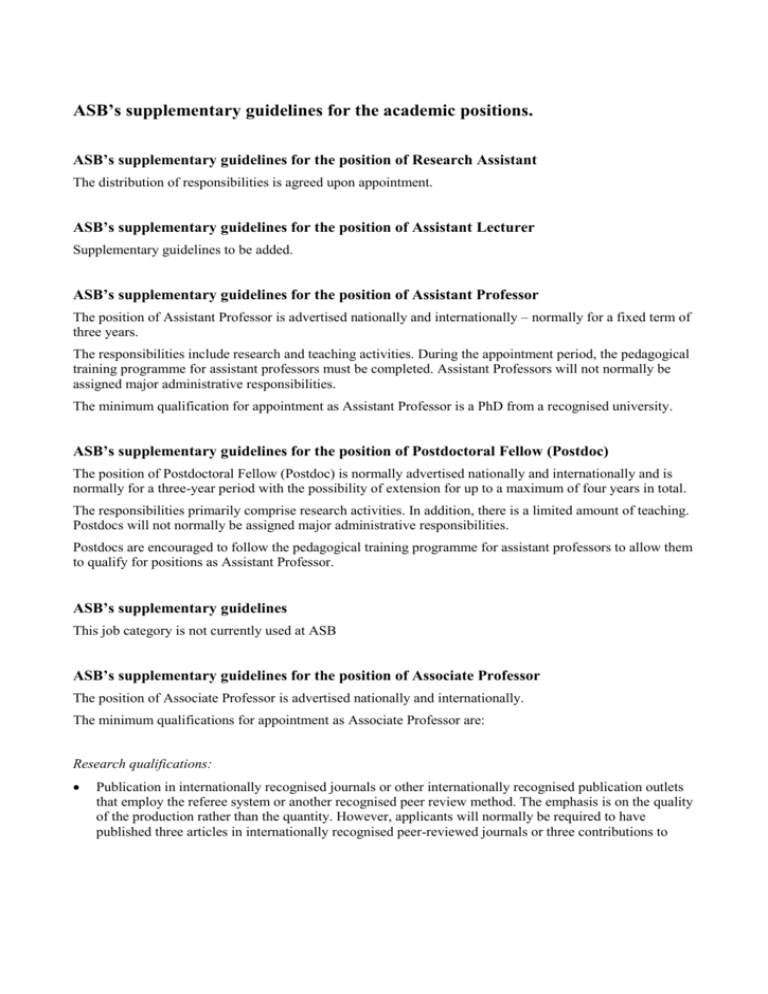
ASB’s supplementary guidelines for the academic positions. ASB’s supplementary guidelines for the position of Research Assistant The distribution of responsibilities is agreed upon appointment. ASB’s supplementary guidelines for the position of Assistant Lecturer Supplementary guidelines to be added. ASB’s supplementary guidelines for the position of Assistant Professor The position of Assistant Professor is advertised nationally and internationally – normally for a fixed term of three years. The responsibilities include research and teaching activities. During the appointment period, the pedagogical training programme for assistant professors must be completed. Assistant Professors will not normally be assigned major administrative responsibilities. The minimum qualification for appointment as Assistant Professor is a PhD from a recognised university. ASB’s supplementary guidelines for the position of Postdoctoral Fellow (Postdoc) The position of Postdoctoral Fellow (Postdoc) is normally advertised nationally and internationally and is normally for a three-year period with the possibility of extension for up to a maximum of four years in total. The responsibilities primarily comprise research activities. In addition, there is a limited amount of teaching. Postdocs will not normally be assigned major administrative responsibilities. Postdocs are encouraged to follow the pedagogical training programme for assistant professors to allow them to qualify for positions as Assistant Professor. ASB’s supplementary guidelines This job category is not currently used at ASB ASB’s supplementary guidelines for the position of Associate Professor The position of Associate Professor is advertised nationally and internationally. The minimum qualifications for appointment as Associate Professor are: Research qualifications: Publication in internationally recognised journals or other internationally recognised publication outlets that employ the referee system or another recognised peer review method. The emphasis is on the quality of the production rather than the quantity. However, applicants will normally be required to have published three articles in internationally recognised peer-reviewed journals or three contributions to other internationally recognised outlets that employ the referee system or another recognised peer review method. 1 Applicants are also expected to have recent publishing activities at international level. It is not a requirement that all the publications have been finally published by the end of the appointment period for the assistant professorship, but they should as a minimum have been accepted for publication. It would be natural for one or more of the publications to be based on or be an edited version of the applicant’s PhD thesis, however the applicant must demonstrate that the research conducted during his or her assistant professorship has developed beyond the scope of the PhD thesis. Applicants must be able to demonstrate an ability to cooperate and contribute to the development of a research environment. Applicants must have built up international relations through participation in international conferences, networks and/or through involvement in other types of cross-border collaboration. Teaching qualifications: Applicants must possess excellent teaching qualifications. The teaching qualifications of applicants are evaluated as a minimum via a test lecture. Good teaching qualifications means that the applicant possesses several of the following qualifications: o Good communication skills o Ability to put academic content into perspective in relation to theories, practice and other subjects o Conscious and systematic motivation of correlations between academic content and the teaching methods and forms of evaluations applied o Dedication and ability to motivate students to learn o Will and ability to engage in dialogue with students with a view to ensuring the ongoing evaluation of teaching activities o Desire and ability for academic and methodological innovation o Ability to vary, develop and use different teaching methods o Ability to teach and ensure learning at different academic levels o Desire and ability to develop and strengthen the international dimension of ASB’s study programmes Applicants must have completed a pedagogical training programme for assistant professors. In cases where an applicant has not completed a pedagogical training programme, the applicant must complete such a programme within the first year of the appointment period. Applicants must demonstrate an ability to contribute independently and in cooperation with others to the academic and pedagogical development of a course or study programme. 1 When the final national database/authority list of recognised publication outlets is available, it will be incorporated into the requirements for publication. Dialogue: Applicants are expected to demonstrate skills in communicating to the business community and society in general. Administrative responsibilities: It is not a requirement that applicants have actually been assigned administrative responsibilities, but it will be advantageous if the applicant has been involved in, e.g., the planning of conferences and theme days for the research community, in teaching contexts and for research purposes. ASB’s supplementary guidelines for the position of Professor (salary grade 37) The position of Professor is advertised nationally and internationally and the appointment period is normally indefinite, but can also be for a fixed term. The minimum qualifications for appointment as Professor are: Research qualifications: Publication in internationally recognised journals or other internationally recognised publication outlets that employ the referee system or another recognised peer review method. The emphasis is on the quality of the production rather than the quantity. Some of the applicants’ publications are expected to be in the most recognised publication outlets within the relevant subject area and applicants are also expected to have recent publishing activities at international level.2 Applicants must be able to demonstrate an ability to cooperate and contribute to the development of a research environment. Applicants must have built up international relations through participation in international conferences, networks and through involvement in other types of cross-border collaboration. Applicants must be able to demonstrate a special aptitude for research management. Applicants must have received external funding – either as the main applicant or a co-applicant. Applicants must have participated in the assessment of research, e.g., as a member of an assessment committee or as a referee or editor for academic journals or publishing houses. Teaching qualifications: 2 Applicants must possess excellent teaching qualifications. The teaching qualifications of applicants are evaluated as a minimum via a test lecture. Good teaching qualifications means that the applicant possesses several of the following qualifications: o Good communication skills o Ability to put academic content into perspective in relation to theories, practice and other subjects o Conscious and systematic motivation of correlations between academic content and the teaching methods and forms of evaluations applied When the final national database/authority list of recognised publication outlets is available, it will be incorporated into the requirements for publication. o Dedication and ability to motivate students to learn o Will and ability to engage in dialogue with students with a view to ensuring the ongoing evaluation of teaching activities o Desire and ability for academic and methodological innovation o Ability to vary, develop and use different teaching methods o Ability to teach and ensure learning at different academic levels o Desire and ability to develop and strengthen the international dimension of ASB’s study programmes Applicants must have extensive teaching experience (e.g. at various educational levels and using a variety of teaching methods). Applicants must demonstrate an ability to contribute independently and in cooperation with others to the academic and pedagogical development of courses or study programme. Applicants must have experience with teaching-related management and coordination. Dialogue: Applicants must demonstrate excellent skills in communicating to the business community and society in general. Dialogue, in this context, is an activity in which own research or that of others is communicated to groups outside the research community – usually to the business community, but also to students or society in general. Examples of such activities include feature articles, interviews, lectures for companies, continuing and further education activities under the auspices of ASB Executive, alumni activities, (contributions to) textbooks or other publications that communicate research. Administrative responsibilities: Applicants must be able to demonstrate skills in and a willingness to carry out administrative tasks, e.g. research management, department management, study programme management, council and committee membership. ASB’s supplementary guidelines for the position of Professor with Special Responsibilities The position of Professor with Special Responsibilities is advertised nationally and internationally. The qualification requirements for the position of Professor with Special Responsibilities correspond to the requirements for standard professorships. However, the position of Professor with Special Responsibilities is primarily for the appointment of particularly talented, younger researchers. Consequently, the requirements for the scope of the applicant’s academic production are not quite as high. Instead, there is extra emphasis on the applicant’s research potential and his or her ability to carry out the special responsibilities stated in the job description. The minimum qualifications for appointment as Professor are: Research qualifications: Publication in internationally recognised journals or other internationally recognised publication outlets that employ the referee system or another recognised peer review method. The emphasis is on the quality of the production rather than the quantity. Some of the applicants’ publications are expected to be in the most recognised publication outlets within the relevant subject area and applicants are also expected to have recent publishing activities at international level.3 Applicants must be able to demonstrate an ability to cooperate and contribute to the development of a research environment. Applicants must have built up international relations through participation in international conferences, networks and through involvement in other types of cross-border collaboration. Applicants must be able to demonstrate an aptitude for research management. Applicants must have received external funding – either as the main applicant or a co-applicant. Applicants must have participated in the assessment of research, e.g., as a member of an assessment committee or as a referee or editor for academic journals or publishing houses. Teaching qualifications: Applicants must possess excellent teaching qualifications. The teaching qualifications of applicants are evaluated as a minimum via a test lecture. Good teaching qualifications means that the applicant possesses several of the following qualifications: o Good communication skills o Ability to put academic content into perspective in relation to theories, practice and other subjects o Conscious and systematic motivation of correlations between academic content and the teaching methods and forms of evaluations applied o Dedication and ability to motivate students to learn o Will and ability to engage in dialogue with students with a view to ensuring the ongoing evaluation of teaching activities o Desire and ability for academic and methodological innovation o Ability to vary, develop and use different teaching methods o Ability to teach and ensure learning at different academic levels o Desire and ability to develop and strengthen the international dimension of ASB’s study programmes Applicants must have comprehensive teaching experience (e.g. within various educational levels and teaching methods). Applicants must demonstrate an ability to contribute independently and in cooperation with others to the academic and pedagogical development of a course or study programme. Applicants must have experience with teaching-related management and coordination. 3 When the final national database/authority list of recognised publication outlets is available, it will be incorporated into the requirements for publication. Dialogue: Applicants must demonstrate excellent skills in communicating to the business community and society in general. Dialogue, in this context, is an activity in which own research or that of others is communicated to groups outside the research community – usually to the business community, but also to students or society in general. Examples of such activities might be feature articles, interviews, lectures for companies, continuing and further education activities under the auspices of CEE, alumni activities, (contributions to) textbooks or other publications that communicate research. Administrative responsibilities: Applicants must be able to demonstrate skills in and a willingness to carry out administrative tasks, e.g. research management, department management, study programme management, council and committee membership.
